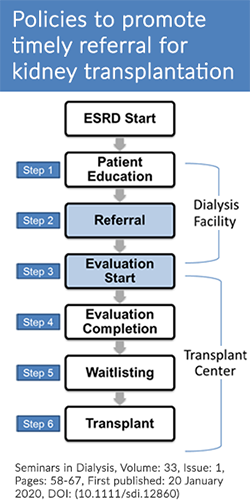 More than 500,000 Americans have end-stage kidney disease (ESKD), a condition in which the kidneys have nearly stopped working and a person needs regular dialysis or a kidney transplant to live. Dialysis is a costly treatment that takes 3 to 5 hours, typically several times a week at a dialysis center, to filter a person’s blood as healthy kidneys would do. Kidney transplantation is not only cheaper than long-term dialysis but also improves survival and quality of life for eligible people with ESKD. However, only 18.5% of Americans with ESKD are on the waitlist for a kidney transplant.
More than 500,000 Americans have end-stage kidney disease (ESKD), a condition in which the kidneys have nearly stopped working and a person needs regular dialysis or a kidney transplant to live. Dialysis is a costly treatment that takes 3 to 5 hours, typically several times a week at a dialysis center, to filter a person’s blood as healthy kidneys would do. Kidney transplantation is not only cheaper than long-term dialysis but also improves survival and quality of life for eligible people with ESKD. However, only 18.5% of Americans with ESKD are on the waitlist for a kidney transplant.
Most people with ESKD learn about kidney transplants at their dialysis facilities. Physicians at these facilities refer patients to a transplant center, and after completing several more steps, patients can get onto the transplant list (see Figure 1), although not everyone with ESKD is a transplant candidate. Two researchers who received funding from NIMHD have reviewed the reasons why people do not get kidney transplants. More than 7,000 dialysis facilities and about 250 kidney transplant centers exist in the United States. However, no standard guidelines exist for determining which people with EKSD are eligible for a kidney transplant, so dialysis providers may have varying opinions on who is a good candidate for a transplant.

In addition, dialysis clinics and transplant centers do not have standard ways of communicating, which makes it difficult to track referrals and updates in patient status. The researchers also found that African Americans, women, and people with low socioeconomic status are less likely to be wait-listed or receive a transplant.
The researchers propose policies for improving the referral process and the start of transplant evaluation. They suggest that both dialysis facilities and transplant centers should provide patient education on transplantation and that the Centers for Medicare & Medicaid Services (CMS) should develop standards for which topics this education should cover. Basic topics should include the benefits and side effects of transplantation, eligibility criteria, and financial and social support considerations. Federal policies should encourage national data tracking of transplant referrals and when evaluations start. This information could help ensure that eligible people with ESKD receive timely referrals for transplant and increase transplant rates. National referral data could also help researchers understand the barriers to transplant referral. Ultimately, the proposed policies would make it easier for dialysis providers and transplant centers to work together in taking care of patients who could benefit from a kidney transplant. With more kidney transplants, more people with ESKD may enjoy longer lives and better quality of life.
Page updated January 14, 2022

